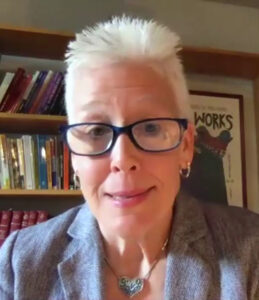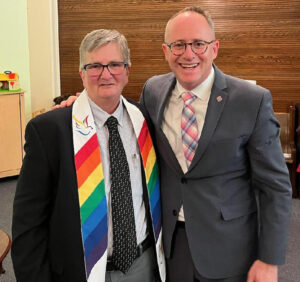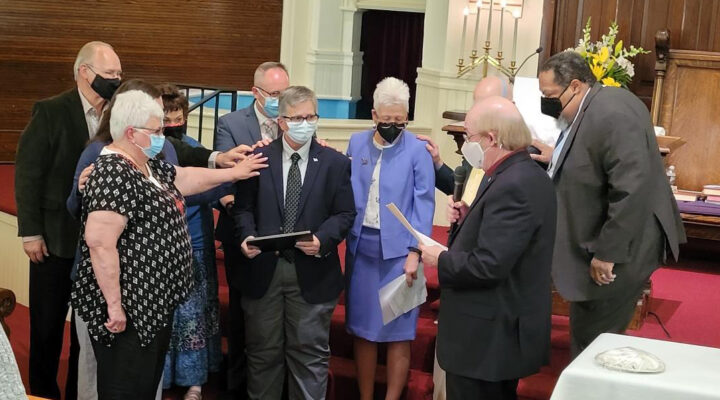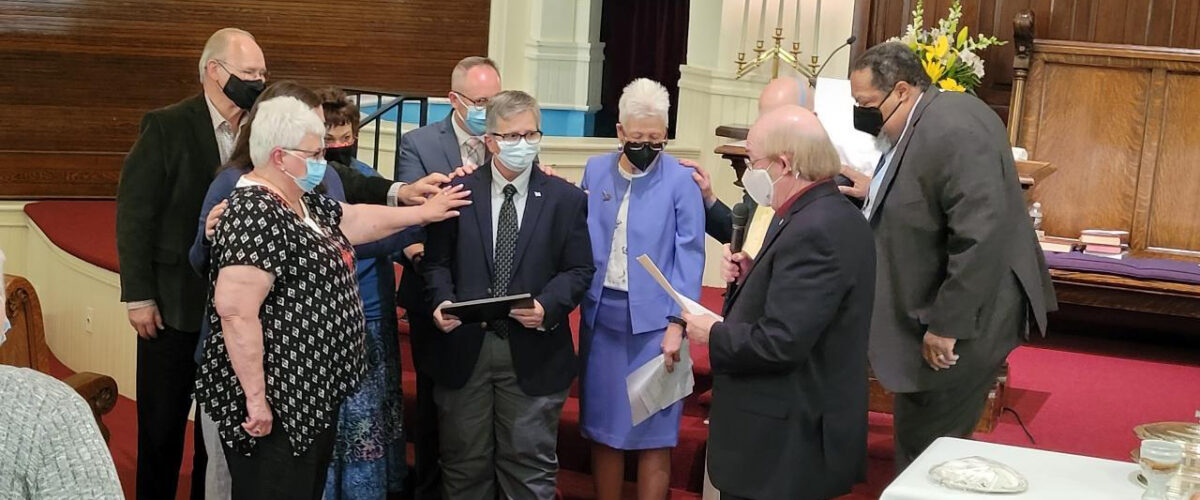A recent lay ministry licensing ceremony capped a multi-year ordeal for Joel Dugan, a 63-year-old transgender man who overcame the rejection of a Baptist association to live into his calling to serve his church and the LGBTQ community.
The feeling generated by the May 1 licensing service at First Baptist Church in Pottstown, Pa., was one of liberation, said Dugan, a member of the congregation since the early 2000s. “It was awesome. It felt great. It was a big relief. It was humbling. It was encouraging to know these people trusted me enough to license me, and that means a lot.”
His elation was due in part to finally being able to openly embrace both his gender and spiritual identities by answering the call to lay gospel ministry first sensed during childhood. But it also was a moment of victory after a difficult, lengthy and unsuccessful licensing training process through a different association of the American Baptist Churches of Pennsylvania and Delaware, which is a region of ABCUSA.

Marcia Bailey
“We have since left that association and moved our membership to the Philadelphia Baptist Association, in part because of (their) treatment of Joel,” said Marcia Bailey, pastor at First Baptist Church. “I was with Joel at the final meeting when he had completed his training and made his presentation to a panel. The group rejected him because he is transgender.”
That was shortly before the onset of the COVID-19 pandemic in 2020 and after Dugan, who was consistently transparent about his gender identity with the association, had undergone six years of training for ministry.
“They were well aware of his journey the whole time and they let him go forward,” Bailey said. “Our congregation was offended on Joel’s behalf, and hurt, and we said we can still license him as Baptists without their blessing. And we had planned to do so, but then COVID came along.”
It was another two years before First Baptist would worship in-person again. That was on May 1 and the entire service was dedicated to Dugan’s licensing.
“In January, as we saw the light at the end of the tunnel with the pandemic, I approached him and said, ‘We want to license you.’ Our ministry coordination team had voted unanimously to license him. He said he thought everyone had forgotten.”
But the church had remained resolute in its support of Dugan, Bailey said, which is in keeping with its character as the only welcoming and affirming church in the small city located about 40 miles northwest of Philadelphia. It is a member of the Association of Welcoming and Affirming Baptists.
“The congregation accompanied him and supported him through his training and some folks even supported him financially. And we have given him opportunities to exercise leadership by preaching occasionally, leading Bible studies and visiting people on the congregation’s behalf,” Bailey said.
She lauded James McJunkin, executive minister of Philadelphia Baptist Association, for his support of Dugan and the church and for attending the licensing service.

Brian Henderson (right) congratulates Joel Dugan.
AWAB was another ally in Dugan’s corner. Brian Henderson, national coordinator of the organization, sent a letter of protest to the region and association after its rejection of Dugan, and he flew in from his home base in Colorado to preach at the May licensing.
“As Baptists, we know we will see any number of theological convictions differently. As Baptists, however, we also hope we can continue to uphold our historic distinctives of soul freedom, Bible freedom, church freedom and religious freedom,” Henderson wrote in his December 2019 letter. “Under this umbrella of historic commitments, we believe there can be room for all of us within our Baptist family. As we have come to understand the situation involving Mr. Dugan, hurtful assumptions, comments and decisions were made that are not in keeping with the inclusive ministry we see demonstrated by Jesus in the Gospels.”
Henderson added he was disturbed that the association had allowed Dugan to progress steadily through the process without stating its objections to his transgender identity. “In my letter I wanted to communicate that it’s OK to make decisions and stand by them, but that the values behind them should be made clear.”
What’s clear about Dugan is that his calling is authentic and that he is the first trans man AWAB knows of to be licensed in American Baptist life, Henderson said. He added that the experience of training, rejection and eventual triumph will make Dugan a stronger minister.
“While there has been a lot of hurt and woundedness, I know it’s given him even more passion to be committed to creating a safe space for folks to be because he knows what it’s like not to be in a safe space.”
That space, Dugan explained, will include a planned drop-in center for other-than-heterosexual people at First Baptist and which the church will host in partnership with the LGBT Center of Greater Reading, Pa.
“This is a place where I will be able to make a safe space for people like me, to reassure them that they are OK and nothing is wrong with them,” Dugan said about the project he is heading.
Dugan, who does not have plans for ordination, said he feels more at home in his faith now that he can be an openly trans lay minister. “I feel a responsibility to represent transgender people to the best of my ability. There is a responsibility that goes with the gifts that you’re given.”
In Baptist polity, licensing is a way of setting aside someone called to ministry that is similar, but not the same, as ordination. In some cases, young ministers are licensed before they are later ordained, but in some cases, licensing is the end goal.
Related articles:
Baptist church calls transgender pastor
Indiana church ordains transgender minister
Q&A with June Joplin on life as an itinerant (transgender) preacher


